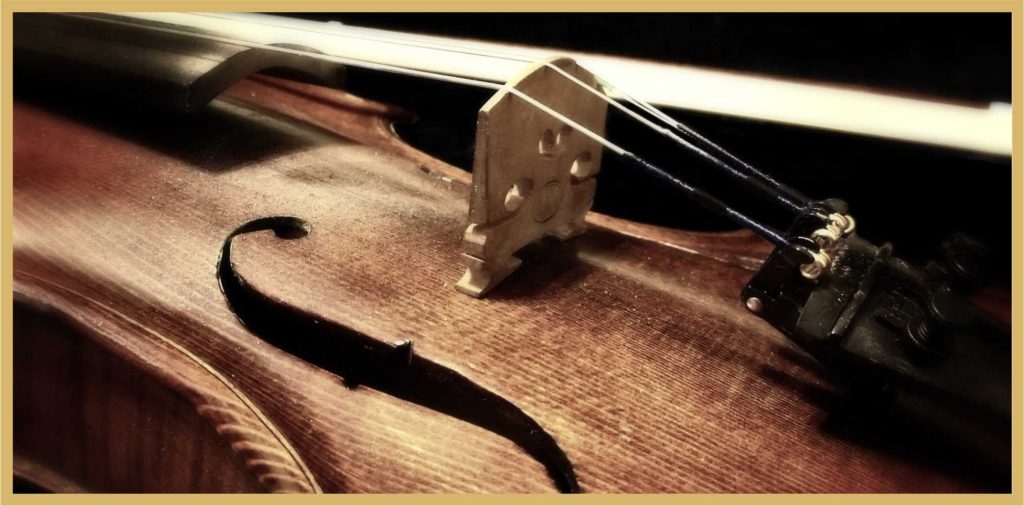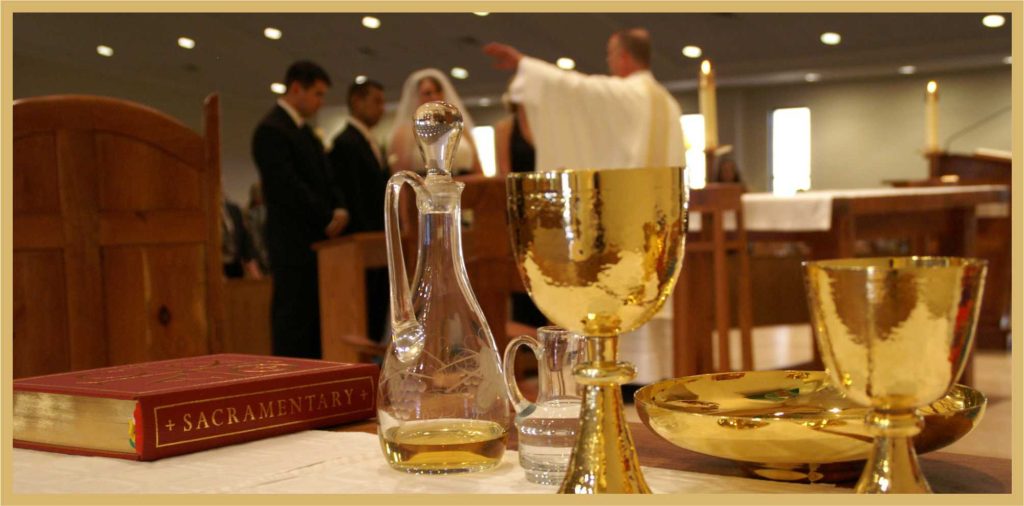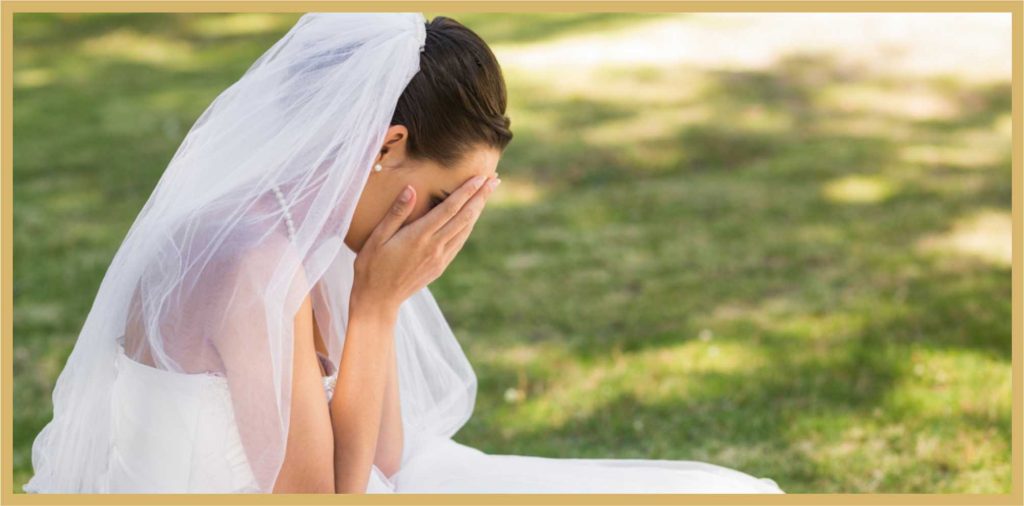The religious ceremony is surely the most important moment of your entire wedding in terms of suggestion, emotion, apprehension and excitement, feelings these are experienced not only by the bridal couple but also by all those attending the ceremony. During the celebration, music is of paramount importance in enriching, enhancing, and amplifying all these feelings and making the bride and groom and their guests experience a ceremony that will remain positively in everyone’s memories.
In this article I wanted to point you to all those things that are often overlooked in organizing a religious ceremony.
What tools to focus on to achieve an impressive ceremony?
First of all, the instruments that are usually used in the church are:
- Organ
- Harp
- Keyboard
- Guitar
- Violin
- Transverse Flute
- Viola
- Cello
These tools can be complemented by:
- Lyric Voice (Female)
- Lyric Voice (Male)
- Modern Voice
- Graduated voice in opera and modern singing
- Polyphonic choir
- Gospel Choir

The musical set list should reflect the style of the ceremony, respect the sacredness of the moment and serve as accompaniment by letting it prevail only at certain moments.If you choose to use a choir instead, we recommend that you include the lyrics of the songs in the ceremony booklet so that all guests have the opportunity to sing along if they feel like it.
The most important moments in church music
Before choosing musicians, it is good to know which moments are scheduled for background music during the religious rite; Mistakenly, people tend to think that they are limited to 5/6 interventions while in reality they are three times as many:
1.Anticipation-In the vicinity of the bride’s arrival, musicians begin playing a light background to limit the buzz that is often generated during this period and also to bring guests into the sacredness of the moment.
2. Groom’s entrance – We are still outside the ceremony, so by agreeing with the priest you can be a bit daring in your choice of song as long as it is exclusively instrumental
3.Entrance of the bride – The same applies as for the groom. By agreeing it with the priest you can dare always respecting the sacredness of the environment in which you find yourself; The bride’s song, unlike the groom’s which is faded out upon his arrival at the altar, will continue as long as necessary to allow the bride to sit down and arrange her dress perhaps aided by the witnesses. The bride’s entrance has always been one of the most emotional moments of the wedding along with the exchange of vows, so it should be personalized with a song that fits the mood the bride has always dreamed of.
4.Beginning – Non-mandatory hymn at the discretion of the priest
5.Remembrance of baptism/ Aspersion – Non-mandatory rite at the discretion of the priest.
6.Gloria – Usually recited, unless otherwise directed by the priest
7.Hallelujah – Compulsory sung song, possibly assembly.
8.Exchange of rings-Lightbackground that should not distract attention from the bride and groom and their vows. The same song can be played again after the consecration of the new family with the addition of the hymn-
9.Holy – As with Hallelujah, a sung song is required, possibly an assembly song
10.Pace – Non-mandatory song at the discretion of the bride and groom
11.Offertory – Whether or not to use a sung song for this moment depends on the bride and groom’s decision whether or not to bring additional gifts to the altar in addition to the Bread and Wine. If readings are provided for this, the piece must be forced instrumental otherwise it can be sung.

12.Communion – Moment of deep meditation and spiritual reunion;With our Team we usually advise the bride and groom to provide at least 2 songs to accompany communion: a first instrumental-only song and a second sung song.
13.Reading of articles – Non-mandatory song at the discretion of the bride and groom. We recommend a light background to make this bureaucratic moment slightly more delicate.
14.Signing – The de facto ceremony is over, usually the signing of the registers takes place on the altar or in the rectory after the priest has given everyone a final blessing and a wish for a good continuation of the day. At this juncture you can be a bit daring and choose songs that, as mentioned for your entrances, take into account the sacredness of the environment you are in and possibly are approved by the priest even if they are not recognized by the church. Guests who will stay in the church to wish you well or take a couple of ritual photos will surely like the musical accompaniment.
15.Exit of the bride and groom from the church-Contrary towhat happens in movies we tend not to provide songs for the exit from the church with our Team for 2 reasons:
-
- Usually the churches, except in rare cases, are medium-small churches and the stretch between the bride and groom and the exit is really short to travel so providing a song for the exit means that after 30 seconds that the song has started the bride and groom have already crossed the threshold of the exit without being able to enjoy the chosen song.
- After the customary signatures and photos when everyone has left excluding the bride and groom and the musicians, the couple’s thoughts turned to the exit song but to what awaits them outside the church thereafter brave. As a result, they do not pay as much attention and emphasis to the final track
We recommend putting an extra song during signatures and photos in the church rather.
Now that you know what times music is expected during a religious ceremony and what instruments are best suited to achieve an impressive musical accompaniment you can devote yourself to composing the musical set list.
This stage is very delicate because wedding couples often do not have a thorough knowledge regarding a classical repertoire from which they draw in most cases, nor of the GEN red/ GEN green repertoire that is often referred to in order to give the wedding that fresh touch.
That’s why Wedding Symphonyisthe only music agency in Italy to have structured a database that guides the bride and groom in the articulate choice of songs for the different musical moments of the ceremony through a step-by-step guided procedure that will put you in the impossibility of making mistakes and at the same time allow you to customize the ceremony according to your tastes by being able to fish from a very wide repertoire that is both classical and modern at the same time.
Let us now quickly see what only the most popular songs for a church wedding:
The groom’s entrance usually features a mournful song, it should by no means go to steal the show from the majestic entrance of the queen of the party (the bride) so the choice often falls on cadenced songs such as:
- Canon in D – J. Pachelbel
- La Califfa – E. Morricone
- Barcarola – J. Offenbach
- Aria on the Fourth String – J.S. Bach
The bride’s entrance, on the other hand, as anticipated just now must be triumphant, majestic that is why the choice often falls on wedding marches such as:
- Lohengrin’s Wedding March – R. Wagner
- Wedding March from The Marriage of Figaro – W.A. Mozart
- Wedding March – F. Mendelssohn
- Chorale from cantata 147 for choir and organ – J.S. Bach
After the rite, you may decide to raise a prayer (through song) to Our Lady that she would bless the newly formed family or opt for a great song:
- Ave Maria – C. Caccini
- Ave Maria – C. Gounoud
- Ave Maria – F. Schubert
- Intermezzo (from Cavalleria Rusticana) – P. Mascagni
During communion music should accompany the recollection and the most intimate prayers of the faithful for this reason it should be soft and melodious, such as:
- Love Dream – R. Schumann
- Adagio in G Minor – T. Albinoni
- Panis Angelicus – C. Frank
- Largo – G. F. Hendel
- Sweet Feel – R. Ortolani
- A time for us – N. Rota
After the final blessing as the bride and groom are about to sign the registers and most of the guests to leave, lively and upbeat music is recommended:
- Chorale from St. Anthony’s – J. Brahms
- Wedding March – F. Mendelssohn
- Hallelujah – G.F. Händel
- Sonata No. 6 from Il Pastor Fido – A. Vivaldi
- Moon river – H. Mancini
- What a wonderful word – L. Amstrong
Music prohibited in church
When thinking about music for the ceremony we often get carried away by the emphasis of the moment and forget about the sacredness of the place that hosts the ceremony in fact it is a well-known fact that in Church it is not possible to perform just any music but only religious music or at least pieces that come close to the impositions of the Roman Curia. This is why, for example, we as Wedding Symphony always ask the bride and groom to have the priest approve the set list that has been created together because, although there are well-defined guidelines, the host always has the final say; It follows that the same song is approved in certain situations and categorically forbidden in others. In addition, we advise you to pay attention to the lyrics of the songs you are going to choose especially if they are in English because behind famous songs with melodious harmonies can be hidden lyrics of dubious taste echo for example 3 striking cases:
1.Someone Like You (Adele) – If you know this song, you cannot say it is not a sweet and somewhat melancholy ballad. Sometimes used as the bride’s entrance this song is about a girl who shows up at her ex-boyfriend’s wedding out of the blue, uninvited to show him all her sorrow for losing her love forever. Don’t you find it slightly tacky to use it as an entrance for your wedding?

2.Hallelujah (L. Cohen)-I believe there is not a person in the world who has not heard at least once in one of a thousand covers by some artist one of Leonard Cohen’s most famous songs “Hallelujah.” A slow, harmonious song that lends itself acoustically to a religious ceremony, but unfortunately the song is about how David denies God in order to be with his best friend’s wife (by the way, the latter will be sent off to die in the war).In the end, however, the relationship between the couple ends badly precisely because it is not blessed by God. Regardless of the fact that it is not a liturgical song, is it just me who finds it slightly out of place?
3.Ave Maria (F. Schubert) – Most people are convinced that the underlying reason for censoring this song at weddings lies in the fact that the Mary Schubert sings about does not correspond to the Mary, mother of Jesus, of Christian culture, but to another woman, Helen, The Lady of the Lake. Schubert in fact took his inspiration from Walter Scott’s “The Lady of the Lake.” Such a poem is fundamentally pagan, which is why its reproduction or even inspired reprise is forbidden by Catholic priests, who forbid it.Basically, the reason is that Schubert wrote this composition not for Our Lady but for his mistress (who was also a prostitute…), and the German poet F. Schiller added the words that are still sung today.
We are aware that often the bride and groom, for fear of having a wedding that is too “classic and traditional,” want to opt for modern and romantic songs, but unfortunately, in Church this is not possible: in liturgical moments we need to find songs that blend with the ceremony while still being able to opt for GEN (Red or Green) songs. These pieces can be an excellent alternative to the classical repertoire as they are almost all recognized by the church being that these 2 groups were born within the experience of the focolarini, at the desire of Chiara Lubich with the will to spread the message aimed at building a more just, peaceful, supportive and united world.
That said.
I hope you have found hints, ideas and useful tips on this article and before we conclude we leave you reminding you that there are however moments within the ceremony when you can dare a bit(always agreeing with the celebrant) namely: Entrance of the groom and the bride, and after the final blessing. Don’t forget that you then have a whole day to listen to your favorite song, going on to personalize the different moments of the reception that will thus have a strong emotional impact such as the bride and groom’s first dance or the cutting of the cake. I invite you to read our article on choosing wedding musicians.
I am Paolo Furlan founder of the music agencies Wedding Symphony specializing in ceremony music and Wedding Music Fun specializing in wedding music and entertainment. Follow our social channels to stay up to date with the latest news and get helpful tips on how to best plan your wedding!
More info awaits you on our blog.
Don’t let them pass you by.
Enjoy your reading and have a good life!

